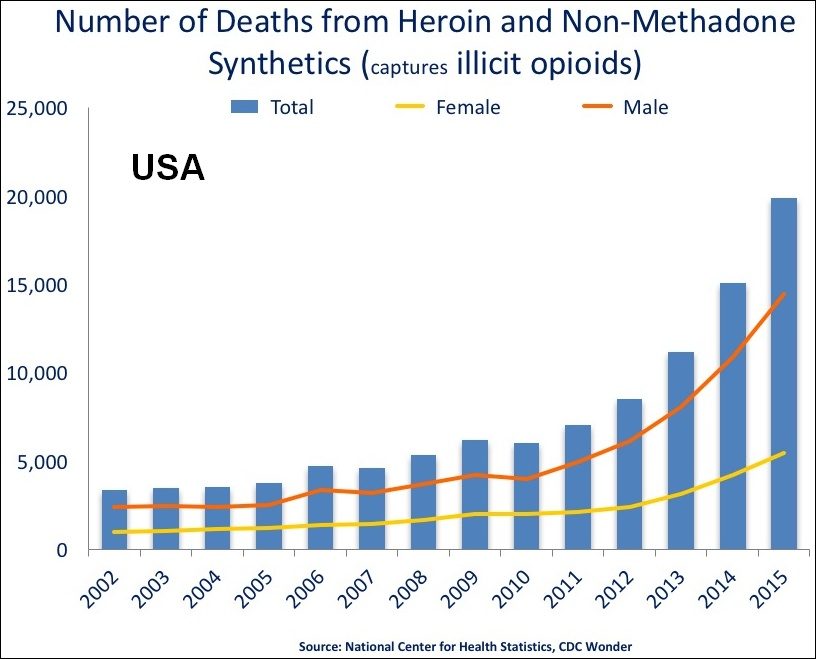Healthcare
Opioid Activist Drops 800 Pound Heroin Spoon In From Of Purdue Pharma’s HQ

US_timeline._Illicit_opioid_deaths | Revised as of September 2017 | By National Institute on Drug Abuse. And User:Timeshifter. I (Timeshifter) cropped the original chart, and added "USA" to it. Freeware IrfanView was used. I put the adapted chart under the same public domain license. See Commons:Convert tables and charts to wiki code or image files, and the section about adding text to chart images. [Public domain], via Wikimedia Commons
A massive, 800-pound sculpture of a burnt heroin spoon appeared outside the headquarters of OxyContin makers Purdue Pharma Friday.
Fernando Luis Alvarez, the owner of an art gallery in Stamford, Conn., placed the spoon in the vehicle drop-off section outside the company’s corporate headquarters in an effort to draw attention to the national opioid epidemic, which many argue was ignited by the irresponsible marketing practices of Purdue Pharma, reports the Hartford Courant.
The activism is also intended to call out the Sackler family, the billionaire owners of Purdue, who largely built their fortune off sales of OxyContin. Police arrested Alvarez over the “guerrilla art,” charging him with a misdemeanor for placing the sculpture at the building and a felony for refusing to remove it.
“I have been extremely bothered and moved by the architects of this epidemic,” Alvarez told the Hartford Courant. “I want to hold this family responsible for what they created and put in front of society and created a modern-day massacre.”
Domenic Esposito, an artists who made the sculpture, aptly named “Purdue,” assisted Alvarez in the drop-off Friday, but will not face any charges over the incident. Esposito said he and Alvarez previously decided who would take the fall with authorities.
Esposito said his brother has struggled with a heroin addiction for 14 years, resulting in several overdoses that began prescription painkillers.
“People say [OxyContin and Percocet] aren’t a big deal, but then you’re hooked and you run out of money and you turn to heroin,” Esposito told the Hartford Courant. “My mom would call me in a panic … screaming she found another burnt spoon. This is a story thousands of families go through.”
Medical professionals say a shift in the 1990s to “institutionalize” pain management opened the doors for pharmaceutical companies to encourage doctors to massively increase painkiller prescriptions, and Purdue Pharma led that effort.
The company, which ended its marketing practice of promoting painkillers to health care professionals in February, previously pleaded guilty in 2007 to felony charges for false marketing of OxyContin and paid $635 million as a result.
“We share the protesters’ concern about the opioid crisis, and respect their right to peacefully express themselves,” said Robert Josephson, spokesman for Purdue Pharma, according to the Hartford Courant. “Purdue is committed to working collaboratively with those affected by this public health crisis on meaningful solutions to help stem the tide of opioid-related overdose deaths.”
Carol Panara, who worked for Purdue Pharma from 2008 to 2013, says she was trained and financially incentivized to persuade doctors to prescribe their opioid painkiller for a wider variety of conditions, and at increasingly higher doses.
Panara claims the company continued to recklessly market OxyContin and severely downplay the risks for addiction and abuse following the 2007 lawsuit from the U.S. Department of Justice.
The company denies allegations of complicity in the opioid epidemic and claims they are committed to curbing rates of opioid abuse.
The Sackler family are listed at 19th on the annual Forbes list of wealthiest families in the country at a worth of $13 billion. The family’s fortune largely comes from OxyContin sales, which its company branded and introduced as an extended release painkiller in 1995.
Purdue Pharma is facing 24 lawsuits filed by state attorneys general and more than 400 lawsuits from cities and counties across the country. They accuse the company of orchestrating a fraudulent marketing scheme to boost sales of OxyContin that downplayed the risks for addiction from pain medication.
All content created by the Daily Caller News Foundation, an independent and nonpartisan newswire service, is available without charge to any legitimate news publisher that can provide a large audience. All republished articles must include our logo, our reporter’s byline and their DCNF affiliation. For any questions about our guidelines or partnering with us, please contact [email protected].

